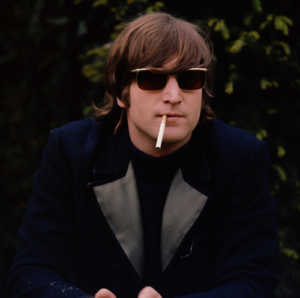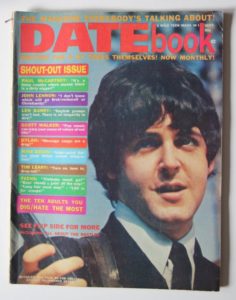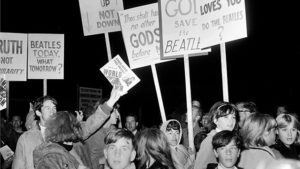
An adoring horde can be a very fickle thing.
Witness the crowds at press time clamoring for the Philadelphia Phillies to win the World Series. They’re cheering loudly now, but Philly fans are notorious for turning on their beloved team very quickly when mistakes are made.
Or witness Jesus of Nazareth, who was welcomed by a Jerusalem crowd shouting praise and lining his path with palm leaves, only to have the same group screaming for his head a few days later.
And look at the example of John Lennon, who was a member of the most popular musical group in history, who made a statement about that very popularity that turned public opinion against him and the rest of the Fab Four very quickly.
Elvis never had such issues. Colonel Parker would only allow him to make statements like “yes, sir” and “no, maam” at interviews. But John Lennon was very plain-spoken, so it was inevitable that he would say something that the rest of the world wouldn’t like. And the original publication of the interview wasn’t the spark that set of the blaze of public opinion against Lennon, it was an otherwise obscure fan magazine that grabbed the statement out of context.

The interview where Lennon made his remarks was with Maureen Cleave of the London Evening Standard. Cleave was a friend of Lennon’s, and so was granted the elusive right to speak with him.
The article was published on March 4, 1966. It went over quietly. The context of the entire piece made it clear that Lennon’s statement was not about dissing Jesus, it was in fact an ironic comment on how popular he and his Liverpool buddies had become, much to his amazement.
Enter a disposable fan mag called DATEbook.
On July 29 of that year, this obscure rag hawked an article on its front page called “The Ten Adults You Dig/Hate The Most.” In the article was this snippet from the Cleave interview:
“Christianity will go. It will vanish and shrink. I needn’t argue with that; I’m right and I will be proved right. We’re more popular than Jesus now; I don’t know which will go first – rock ‘n’ roll or Christianity. Jesus was all right but his disciples were thick and ordinary. It’s them twisting it that ruins it for me.”
The sensationalist magazine sold about a million copies. Angry hordes began organizing Beatle album burnings.

The whole thing had a very Klannish air about it, and, in fact, the KKK joined in, In South Carolina, for example, at one particular rally, the Klan nailed a Beatles record to a large cross and set it on fire. Other Klan spokesmen were quoted as saying that not only were the Beatles blasphemous, but that they were not really ‘white’ either.
Horrified, Cleave publicly stated that the interview should be read in its entirety, but the cat was out of the bag. Manager Brian Epstein also tried in vain to calm things down by speaking out. With a looming US tour in jeopardy, it would be up to Lennon himself to try and squelch the fires of controversy.
In Chicago on August 11, 1966, Lennon held a press conference and publicly apologized for the remark. He didn’t disguise his bewilderment and disappointment that a statement taken out of context could cause such a stink, but apologize he did, much against his wishes.
When the apology hit the airwaves and the print media, the burnings were called off.
But even now, some 42 years after the incident, there are still those who harbor animosity towards the always-outspoken Lennon for a statement that truly did take on a life of its own.